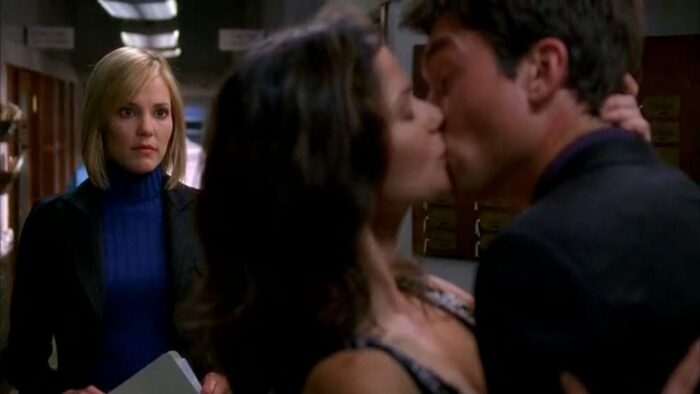Crossing Jordan was an NBC series that ran for six seasons starting in 2001. It followed Boston medical examiner Jordan Cavanaugh (Jill Hennessy), her boss Garret Macy (the late Miguel Ferrer), her co-workers Lily Lebowski (Kathryn Hahn), Bug (Ravi Kapoor), Nigel (Steve Valentine), and Boston PD Homicide detective Woody (Jerry O’Connell). Through its six seasons, we got to see the struggles between Jordan and her coworkers as they presided over cases, interoffice relationships, and personal demons. Crossing Jordan’s main character is someone who can be classified as a “strong female character”. She’s someone who feels like the outcast, is hard to pin down romantically, and completely empowering in how she tackles what is thrown at her.
These traits can also cause many of that character’s situations to be interpreted as having double meanings because of how they would interact with their co-characters. Having Crossing Jordan lean heavily into these characteristics may have sent the message to some viewers, myself included, that Jordan Cavanaugh was a closeted bisexual character way ahead of her time.
For years it has been difficult to find a positive representation of bisexuality in television. Xena and Gabrielle from Xena: The Warrior Princess, Bo Dennis from Lost Girl, and Callie from Grey’s Anatomy are usually the ones that come to mind. The number is so few because I bet writers don’t know to convey it correctly on screen. It’s easy to write a love story where you find love with one or the other sex, but what about when sex isn’t the issue? Sure, the times have gotten better at it because the representation in writer’s rooms has grown, but in the early 2000s, that representation wasn’t there even for lesbian and gay stories.
Thanks to a little show called Wandavision, I found myself recently going and watching a lot of Kathryn Hahn’s other work. Back when Crossing Jordan was originally on I remember watching it and really enjoying it. I was too young to have noticed anything at that time, but I do remember myself really enjoying how complex and different the female characters were on the show. Lily Lebowski was bubbly, always happy to help, and fantastic with making deep connections with people who just lost someone. Jordan was tough, always stood her ground in the things she believed in, and seemed to connect with everyone but especially the other female characters.
Going back and rewatching it this many years after their original airing I’ve found myself looking at the characters and the stories being told with older, and more mature eyes. I’ve grown to view and understand people more which means characters hit me in different ways than they had when I was a little kid still learning about what a morgue was. When rewatching Crossing Jordan there were a lot of moments where I began to notice a lot of choices being made in the storytelling that involved Jordan where it felt as though she became like so many of the other LGBT characters I seem to connect to. Characters where they are so confident in their own skin that they radiate this energy that makes them attractive to their same sex. Alex Danvers in the first season of Supergirl shares this energy and in the second season she ended up having a storyline where she comes out as being lesbian. Given Jordan’s way of sleeping with the opposite sex, bisexuality was something I wouldn’t have taken off the table for her.
Although Crossing Jordan never fully pursued the idea that Jordan Cavanaugh was bisexual there was plenty of subtext within the series that suggest it could have been a direction series creator, Tim Kring, considered.
During the first season, we’re introduced to Jordan’s lawyer friend Kim Watkins (Kristen Wilson) who grew up with Jordan and had gotten close to her when Jordan’s mother was murdered. Of the friends we have been introduced to, Kim is the one that always appears to have a deep cut with her. Every time the two share the screen their performances play more as ex-lovers than best friends. The episode “Blood Relatives” opens with the two having a “girl’s night” that consists of watching Xena The Warrior Princess. Of all the shows to have these two women watch you insist on making them watch one that played such a pivotal part in the LGBT community?
Even later in the same episode, Kim calls Jordan out on taking this particular case involving a woman being murdered and the husband being blamed even though he didn’t do it. After everything is settled and the truth is discovered the two share a moment where Kim tells Jordan that she doesn’t have to face her demons alone. I have watched a lot of lesbian films where this similar situation occurs and I don’t know about you, but I have never looked at my friends the way those two look at one another. It’s sad that Kim is kind of forgotten for the remainder of the series, because the chemistry these two had made for some fun scenes and an interesting dynamic for Jordan outside of the morgue family she created with her coworkers.
Then there’s Jordan’s relationship with Lily. The show repeatedly tells its audience that they are just really good friends. They exercise together, work together, and it actually takes them half of a season to begin the friendship we see throughout the rest of the series. That all said, there are multiple moments where their friendship borders on a line where it could have gone romantic if the show had allowed it to go there.
In “Perfect Storm” everyone is enclosed in the morgue after staff members begin to come down with a virus. During this time there is a quiet moment when Jordan finds herself wandering around the halls and comes across a distraught Lily. The two embrace but then Jordan takes an extra moment to caress her face. Hugging is one thing, but this is not something one does for a friend. Do you stroke your friend’s face?
There is also the moment in the first part of the Season 2 finale “Pandora’s Trunk” where Jordan wakes from a recurring dream involving her mother’s murder. The first person she calls isn’t Woody or Garrett but Lily. The two spend the entire night together chatting, which includes Lily asking Jordan to open up to her by answering a series of questions. When she does, she explains how she has in her possession a key that will unlock a car that may hold vital information about her mother’s case. The catch is, every other time she’s become involved with investigating her mother’s murder she’s lost herself. Lily then explains how she used to watch the 1941 film The Wolfman and how Larry Talbot seeks help from his friends after he’s bitten only to be turned away. What also happens in the film is that Larry has fallen for Gwen, who wants to be with him and help him even though he fears he’s too dangerous to be around. Really Lily is more eager to help Gwen than the dismissive friends that Lily is describing. Using The Wolfman as a metaphor for their friendship makes this scene between them, and the one later on when Jordan gives Lily the key to hide, go above what a normal “sisterhood” would look like.
The writers must have noticed something was happening with how Jordan was being received because there was an episode in Season 2 entirely written on the concept of people wondering if Jordan was gay. The episode, “Scared Straight,” has Jordan investigating the murder of the partner of a popular conservative lesbian radio talk show host. During the episode Lisa Fromer (Mariel Hemingway), the talk show host, asks Jordan if she understands what it means to be in love. This is the first time that Jordan really begins to think about her situation. She’s never really able to connect romantically (at this point of the series) with any men. She constantly finds herself running away from anyone who gets close to her romantically. In the process she begins to have feelings for Lisa, or at least a curiosity for her, because Lisa was someone who was able to break Jordan down when no one else could.
The tabloids end up running a photo of the two of them that becomes the front page and an excuse for her coworkers to taunt her with it. Lisa had even mistaken Jordan’s behaviors during their times together as a type of flirtatious connection.
Near the end of the episode, Jordan finds herself at Lisa’s apartment and when asked why she was there when a simple phone call would have worked, Jordan is speechless. If there was ever a moment in Crossing Jordan introducing the concept of Jordan’s potential bisexuality this episode was going to be it. When Lisa begins to cry as all her pain settles in, Jordan comforts her by holding her. It’s awkward because it’s at this moment Jordan is about to lose herself in her emotions while Lisa feels this draw and wants to give into it. Instead of giving in to her emotions, Jordan backs away, putting herself in denial of any feelings she has. Lisa is the one who is willing to say that she had felt their connection while Jordan admits to feeling intrigued by her.

Crossing Jordan’s very next episode after “Scared Straight” was quick to change pace by having it focus on the blurring line of the friendship between Jordan and Woody. They would be the series’ eventual end game and along the way, Jordan would also find herself falling for journalist, J.D. Pollock (Charles Mesure). I really feel as though neither of them actually captures that same passion you see her have with her female costars, but you still believe she loves them.
This is not to take away from the story that was told and the journey the writers of the show took with Jordan. What I am saying is that if this subtext was able to be more than subtext then this show would have been way ahead of its time. For example, Grey’s Anatomy wouldn’t introduce Callie’s bisexuality storyline for another six years.
I understand that LGBT characters at that time were far and few in between, and that the ones that were around were mainly side roles and not carrying the series. Network television has specific politics that they need to follow and that means playing towards the demographic that the network wants to have represented of them. LGBT characters weren’t a selling point in the early 2000s unless it was on cable where The L Word was. Will and Grace managed to make their show work because it was a comedy and its gay characters were used mainly as comic relief.

In Crossing Jordan‘s later seasons there’s hardly any subtext. It’s almost as though someone had caught on and told them to stop. By Season 3 the writers began to turn up Jordan’s feelings for Woody and the series suddenly became a revolving door of “when will they or won’t they get together?” In Season 5 there’s a moment where Woody’s love interest at the time, Detective Lu (Leslie Bibb), wants him to confront Jordan about their new relationship, but when he does Jordan doesn’t seem fazed by it. Instead, she keeps insisting that she is completely fine with Lu and Woody being a couple. In order to prove her point, she not only kisses Woody but kisses Lu as well.
The subtext in a series can make for a far more interesting viewing experience. Especially if you are rewatching something you haven’t seen since it was originally on. Times change and with it so do our views on how we perceive how certain images come across. Without all the subtext and extra intrigue into Jordan’s character Crossing Jordan would have been just one more run-of-the-mill crime drama series with the same types of characters that all of those shows at the time had. Even though nothing came from it, the subtexts that were given to us (even the Melissa Etheridge poster hanging in her apartment) were a nice touch.

